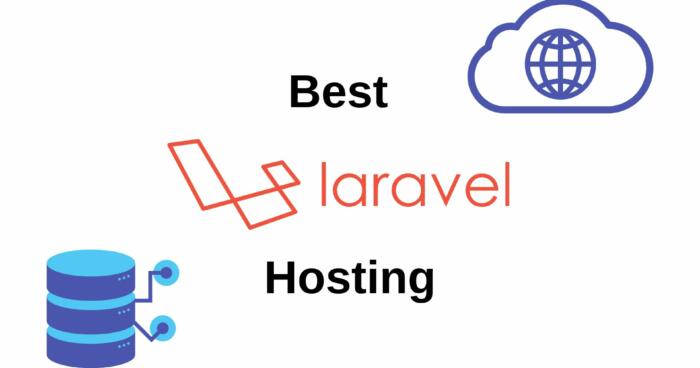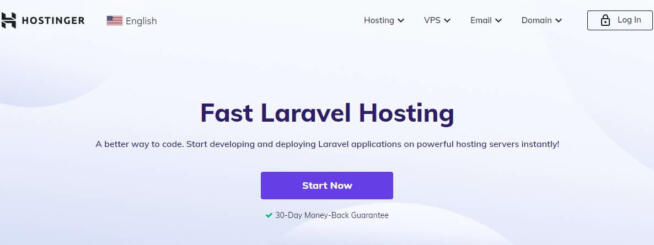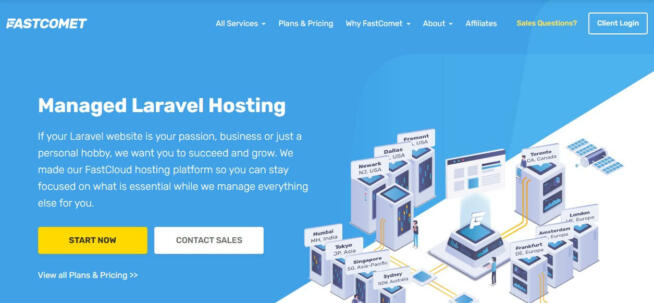Quick answer: The Best Laravel Hosting Provider in 2024 is A2 Hosting!
Most applications and websites are built upon a popular programming language called PHP. PHP is a staple of web development, with many frameworks such as Yii, CodeIgniter, Phalcon, and of course, Laravel, which is the most prevalent framework.
Despite its popularity, not all web hosting solutions are optimized for Laravel, which isn’t great for people who want to take advantage of it. Besides, Laravel offers many tools, such as built-in authentication, object-relational mapping, and complex app development.
As a result, many people are looking for the best Laravel hosting in 2024 that would allow them to host and develop a website using this PHP framework. With some great options on the market, it’s pretty hard to decide on a single choice, as many hosting services don’t support it fully or at all.
But if you ask me, today’s your lucky day. We tested dozens of Laravel hosting providers in 2024 for this list to be able to provide you with the most accurate information based on real-world performance testing. Without a doubt, I advise staying with me until the end of this guide.
1. Best Laravel Hosting in April 2024
When talking about an advanced PHP framework like Laravel, it’s extremely important to seek maximum quality. The providers you see below are known for excellent performance, low latency, and tons of resources for hosting and maintaining your Laravel-based site.
They also differ in prices, and while some choices are very cheap, others might be more expensive, offering more features for the most demanding users. Either way, with the top 6 Laravel hosting providers, we covered everything you need to know, so let us present them to you.
1.1 A2 Hosting
A2 Hosting stands out as a robust option for Laravel hosting due to several key strengths:
-
Performance and Reliability: Known for its Turbo servers, A2 Hosting offers outstanding speeds, which is crucial for any web application, including those built with Laravel. The 99.9% uptime guarantee also ensures your application is stable and available for your users.
-
Security Features: The inclusion of DDoS protection and free automatic backups are significant advantages. These features help in safeguarding your application against common cyber threats and data loss.
-
Laravel Support Across Plans: A2 Hosting supports Laravel in all its subscription plans, making it a versatile choice for various needs and budgets.
-
Cost-Effective Options: With plans starting at $2.99 per month, A2 Hosting provides an affordable entry point for Laravel hosting. This is particularly appealing for individuals or small businesses starting with web development.
-
Variety of Hosting Plans: From shared to VPS and dedicated hosting, A2 Hosting caters to a wide range of hosting needs. This flexibility allows for scaling as your Laravel application grows.
-
Advanced Plans with Enhanced Features: The Turbo Boost and Turbo Max plans are optimized for Laravel and offer faster speeds and more resources, which are beneficial for more demanding applications.
-
User-Friendly Features: The comprehensive cPanel interface, free SSL certificate, and easy Laravel installation make A2 Hosting approachable, especially for those less experienced in managing web hosting.
-
Risk-Free Trial: The 30-day money-back guarantee offers a no-risk opportunity to test their services.
However, it’s also important to consider the potential downside:
- Cost of Dedicated Hosting: While shared and VPS hosting are reasonably priced, the dedicated hosting plans are notably more expensive, which might be a factor for budget-conscious users or smaller projects.
In summary, A2 Hosting’s combination of performance, security, support for Laravel across various plans, and user-friendly features, along with cost-effective options, makes it a strong contender in the Laravel hosting space. However, the cost of their dedicated hosting plans may be a consideration for some users.
1.2 Hostinger
Hostinger is a compelling choice for Laravel hosting for several reasons:
-
Experience and Specialization in Laravel: With a long history in hosting services, Hostinger has honed its expertise, particularly in Laravel hosting, offering specialized features and optimizations.
-
Performance and Reliability: Hostinger provides 99.9% server uptime, which is a critical factor for maintaining the availability and reliability of Laravel applications.
-
Ease of Use: The one-click Laravel installation is a significant time-saver, especially for developers who want to streamline their deployment process.
-
Customizability: The ability to choose from various PHP versions (from 5.2 to 7.2) allows developers to tailor their hosting environment to specific needs and preferences, which is vital for Laravel applications that may have particular version requirements.
-
Enhanced Speed Features: Features like HTTP/2 for faster request processing and Cache Manager for quicker page loading are particularly beneficial for improving the performance of Laravel applications.
-
Affordability: Hostinger’s pricing is very competitive, with plans starting as low as $1.99 per month, making it an attractive option for those on a tight budget.
-
Generous Resources in Basic Plan: Despite its low price, the basic plan offers 50 GB of SSD storage, unlimited free SSL, and supports up to 10,000 monthly visitors, which is adequate for small to medium-sized Laravel projects.
-
Premium Plan for More Demanding Needs: The Premium Web Hosting plan is an excellent choice for more resource-intensive Laravel applications, offering unlimited bandwidth, free email, a free domain, and the capacity to host up to 100 websites.
-
Affordable VPS Hosting for Laravel: Hostinger’s VPS hosting for Laravel starts at just $3.99 per month, which is quite budget-friendly, offering weekly backups, a dedicated IP, full root access, and substantial bandwidth.
-
30-Day Money-Back Guarantee: This refund period adds a layer of confidence for users to try their services without financial risk.
However, there are some drawbacks:
- Backup Frequency: Hostinger offers only weekly backups, which might not be sufficient for sites requiring more frequent data backups.
In summary, Hostinger’s combination of performance, ease of use, customizability, and affordability makes it an attractive option for Laravel hosting. The company’s specialization in Laravel, coupled with features optimized for performance, and various hosting plans that cater to different needs, makes it suitable for a wide range of Laravel projects. However, the frequency of backups could be a limitation for some users.
1.3 Cloudways
Cloudways stands out as a formidable choice for Laravel hosting, particularly for those interested in cloud hosting solutions. Here are several reasons why Cloudways is a good Laravel hosting provider:
-
Specialization in Cloud Hosting: Cloudways focuses exclusively on cloud hosting, which is typically more scalable and reliable than traditional shared or VPS hosting. This makes it an excellent choice for hosting Laravel applications that require scalability and high availability.
-
Multiple Cloud Providers: Cloudways leverages third-party cloud services like DigitalOcean, AWS, Google Cloud, Linode, and Vultr. This wide range of options allows users to choose a provider that best meets their specific needs in terms of performance, location, and cost.
-
Comprehensive Features: All plans include essential features like free SSL, site migrations, unlimited application installations, automated backups, Auto Healing for server health, and SSH/SFTP access. These features are crucial for maintaining and managing Laravel applications effectively.
-
Flexible Pricing and Plans: With plans starting as low as $10 per month, Cloudways offers a variety of options to suit different budgets and resource requirements. The ability to choose from different tiers within providers like DigitalOcean and AWS provides great flexibility.
-
GIT Access for Easy Laravel Deployment: The support for GIT access simplifies the process of deploying and updating Laravel applications, which is beneficial for developers who rely on version control systems.
-
Extensive Global Reach: With 59 data centers across 33 cities in 15 countries, Cloudways offers a global presence, which is vital for deploying applications closer to the user base and ensuring faster load times.
-
Free Trial Period: The 3-day free trial allows users to test the services before committing financially, which is a valuable opportunity to gauge the platform’s suitability for specific Laravel projects.
-
HTTP/2 Support in All Plans: This modern network protocol enhances the speed and performance of web applications, including those built with Laravel.
-
24/7 Support: Continuous support is crucial, especially in cloud hosting environments where issues can be more complex.
However, Cloudways does have a few drawbacks:
-
Complex Pricing Structure: The diverse range of plans across different cloud providers can make the pricing structure somewhat complex and potentially overwhelming for new users.
-
Short Free Trial: The 3-day trial period might be considered short for thoroughly testing a hosting environment, especially for complex applications.
In summary, Cloudways is an excellent choice for Laravel hosting, especially for those who prefer the scalability and performance of cloud hosting. Its extensive range of features, support for multiple cloud providers, and global data center presence make it a versatile and powerful hosting option for Laravel applications. However, potential users should be mindful of the complex pricing structure and the relatively brief trial period.
1.4 Dreamhost
Dreamhost presents itself as a strong contender in the realm of Laravel hosting for several reasons:
-
Ease of Use: Dreamhost is recognized for its user-friendly platform, making it simple for users to deploy Laravel-based applications. The straightforward installation process across various hosting types is a significant advantage, especially for those new to web hosting.
-
Diverse Plan Options: Offering a wide range of subscription plans, Dreamhost caters to different hosting needs and budgets. This variety allows Laravel users to select a plan that aligns with their specific requirements.
-
Shared Hosting Benefits: Despite the general preference for other types of hosting for Laravel, Dreamhost’s shared hosting plans offer compelling features like a free domain, unlimited traffic, and unmetered bandwidth, even in its most basic plan.
-
SSD Storage and Free SSL Certificate: Fast SSD storage enhances website performance, and the inclusion of a free SSL certificate is crucial for website security and trust.
-
Competitive Pricing: The Starter plan, priced at $2.95 per month, is quite affordable and includes features like WP Website Builder and free migrations, making it an attractive option for those starting with Laravel.
-
VPS Hosting for Enhanced Performance: The VPS plan with 1 GB of RAM is particularly suitable for Laravel applications, offering unlimited site hosting, 30 GB of SSD storage, unlimited emails, and premium support for $13.75 a month.
-
Dedicated Hosting for High-End Needs: For more resource-intensive Laravel applications, Dreamhost’s dedicated hosting provides robust solutions, including full root access, DDoS protection, and high-performance CPUs. However, this comes at a higher price.
-
Uptime Guarantee: Dreamhost’s 100% uptime guarantee is outstanding, ensuring maximum availability and stability for Laravel applications.
-
Exceptional Money-Back Guarantee: The 97-day money-back guarantee for shared hosting plans paid via credit/debit card is one of the longest in the industry, offering a risk-free trial period.
However, there are limitations to consider:
-
Limited Server Locations: Dreamhost has data centers only in the US, which might not be ideal for users targeting audiences in Europe or Asia.
-
Cost of Dedicated Hosting: The dedicated hosting plans are relatively expensive, which might not be feasible for smaller projects or those on a tight budget.
In summary, Dreamhost is a good Laravel hosting provider due to its ease of use, variety of plans, competitive pricing, and robust features like SSD storage and a 100% uptime guarantee. While it offers excellent options for both shared and VPS hosting, the limited server locations and the higher cost of dedicated hosting are potential drawbacks to consider.
1.5 FastComet
FastComet emerges as a notable choice for Laravel hosting for various reasons:
-
Comprehensive Laravel Support: FastComet offers native support for the Laravel PHP framework across all its hosting types, from shared to dedicated hosting. This broad support is particularly beneficial for developers looking to build and deploy Laravel-based applications.
-
High Reliability: With a 99.9% uptime commitment and a 100% network guarantee, coupled with over 10,000 daily server checks, FastComet ensures high reliability and stability for hosted applications.
-
Global Data Center Presence: The presence of data centers across multiple regions including the US, Europe, Asia, Australia, and India, enhances the performance and accessibility of hosted applications. This global reach is critical for businesses targeting international audiences.
-
Affordable Shared Hosting Plans: Starting at just $1.99 a month, FastComet’s shared hosting plans are budget-friendly and include valuable features like free domain registration and transfers, and a cPanel with Softaculous for easy Laravel deployment.
-
Softaculous for Easy Laravel Deployment: The inclusion of Softaculous in the cPanel simplifies the installation and management of Laravel applications, making it more accessible, especially for those with less technical expertise.
-
Managed Cloud VPS Hosting Options: FastComet offers managed cloud VPS hosting solutions at competitive prices, starting at $41.96 a month. These plans provide adequate resources like RAM, CPU, SSD space, and bandwidth for more demanding Laravel applications.
-
Reasonably Priced Dedicated Hosting: The dedicated hosting plans, starting at $97.3 a month, are relatively more affordable compared to some competitors, making them a viable option for high-resource Laravel projects.
-
Generous Money-Back Guarantee: A 45-day money-back guarantee for shared plans provides a risk-free opportunity for users to test the services.
-
Worldwide Performance: The extensive network of data centers ensures that websites hosted with FastComet perform well globally, without significant slowdowns.
However, there is a notable limitation:
- Storage Space: While FastComet offers many benefits, it could provide more storage space, especially in its lower-tier plans, to accommodate growing websites and applications.
In summary, FastComet is a strong candidate for Laravel hosting due to its comprehensive framework support, global data center network, affordability, and user-friendly features like Softaculous. Its range of hosting options caters to various needs, from small projects to more resource-intensive applications. The only significant drawback is the limited storage space in some plans, which might be a concern for larger, more complex Laravel applications.
1.6 LiquidWeb
LiquidWeb is a strong candidate for Laravel hosting, offering several features and benefits that make it attractive for hosting Laravel applications:
-
Global Data Center Reach: With data centers in both the US and Europe, LiquidWeb can provide excellent geographic coverage, ensuring better speeds and performance for a global audience. This is particularly important for Laravel applications targeting users across different regions.
-
Full Laravel Support Across Plans: LiquidWeb supports Laravel in all its hosting plans, offering flexibility and assurance that the Laravel framework will work seamlessly with their hosting solutions.
-
Emphasis on VPS and Dedicated Server Hosting: By focusing on VPS and dedicated server hosting, LiquidWeb caters to Laravel applications that require more resources, reliability, and control. This makes it an ideal choice for medium to large-scale Laravel projects.
-
Competitively Priced VPS Hosting: The VPS hosting plans are quite affordable, starting at $25 a month for 2 GB RAM. This plan includes 10 TB bandwidth, a 2-core CPU, and 40 GB of SSD storage, which should suffice for moderately large Laravel websites.
-
cPanel and Off-Server Backups: The inclusion of cPanel for easy management and off-server backups for additional reliability are significant advantages, offering ease of use and enhanced data protection.
-
Robust Security Features: With multi-level DDoS protection, LiquidWeb ensures that your Laravel application is safeguarded against common internet threats.
-
24/7 On-Site Support: Access to constant on-site support through live chat, email, and phone is a major plus, especially for critical applications where quick resolution of issues is essential.
-
High-Performance Dedicated Hosting: For larger, more demanding Laravel sites, LiquidWeb’s dedicated hosting plans, starting at $149 a month, offer robust performance with features like quad-core CPUs and substantial RAM.
-
Choice Between Managed and Unmanaged Solutions: The flexibility to choose between managed and unmanaged hosting plans allows customers to select the level of control and support they need.
However, there are some potential drawbacks to consider:
-
Lack of Shared Hosting Options: LiquidWeb does not offer shared hosting for Laravel, which might be a limiting factor for smaller projects or those with limited budgets.
-
High Costs of Dedicated Hosting: While VPS hosting is affordable, the dedicated hosting plans are considerably more expensive, which might not be feasible for all users.
In summary, LiquidWeb is an excellent option for Laravel hosting, especially for those requiring more robust hosting solutions like VPS and dedicated servers. Its global data center presence, strong support for Laravel, and reliable hosting infrastructure make it a suitable choice for a range of Laravel applications. However, the absence of shared hosting and the high cost of dedicated plans may limit its appeal to users with smaller projects or tighter budgets.
Selecting the right hosting for a Laravel application involves considering several key factors to ensure optimal performance, security, and ease of deployment. Here’s a guide to help you choose the best Laravel hosting:
1. Server Requirements Compatibility
- PHP Version: Ensure the hosting provider supports the PHP version required by your Laravel version, typically PHP 7.3 or newer.
- Extensions: Check for required PHP extensions like OpenSSL, PDO, Mbstring, Tokenizer, XML, Ctype, and JSON.
- Composer: Make sure the hosting environment allows SSH access to use Composer, essential for managing Laravel dependencies.
2. Performance and Scalability
- Server Performance: Look for high-performance servers that can handle the demands of a Laravel application, considering CPU, RAM, and storage technologies (SSD is preferable).
- Scalability: Choose a hosting solution that allows you to easily scale resources up or down based on your application’s needs, such as cloud or VPS hosting.
3. Development and Deployment Features
- Git Integration: For easier version control and deployment, look for hosting that offers Git integration.
- Staging Environments: A staging environment is beneficial for testing changes without affecting the live application.
- Deployment Tools: Some hosts offer specific deployment tools or integrations with CI/CD pipelines, which can simplify deploying Laravel applications.
4. Database Support
- Supported Databases: Ensure the hosting provider supports the databases Laravel uses, like MySQL, PostgreSQL, or SQLite, and provides easy management tools and backups.
5. Security
- SSL Certificates: Free SSL certificates (like Let’s Encrypt) are a must for securing your application.
- Firewall and DDoS Protection: Look for advanced security features, including firewalls and DDoS protection, to safeguard your Laravel application.
- Regular Backups: Ensure the hosting provider offers regular, automatic backups to protect your data.
6. Support and Reliability
- Customer Support: Reliable, 24/7 customer support is crucial, especially if you encounter issues or need assistance with server-related tasks.
- Uptime Guarantees: Opt for hosting with high uptime guarantees (99.9% or higher) to ensure your application is always available to users.
7. Ease of Use
- Control Panel: A user-friendly control panel for managing hosting settings, databases, and email accounts can significantly ease server management.
- One-Click Installers: Some hosts offer one-click installers for Laravel, making it easier to set up a new Laravel application.
8. Pricing and Plans
- Cost-Effectiveness: Compare pricing plans across different hosting providers to find one that offers the best value for your requirements.
- Scalability vs. Cost: Consider how costs will change as you scale your resources and ensure it aligns with your budget.
9. Reviews and Reputation
- Customer Reviews: Look for customer reviews and testimonials specifically from Laravel developers to gauge the hosting provider’s compatibility with Laravel applications.
- Reputation: Consider the hosting provider’s reputation in the industry, particularly regarding uptime, customer support, and performance.
10. Specialized Laravel Hosting
- Laravel-Specific Hosting: Some providers offer hosting specifically optimized for Laravel, which might include pre-configured environments, Laravel-specific caching, and other features tailored to Laravel applications.
What is Laravel
Laravel is a free, open-source PHP web framework created by Taylor Otwell and initially released in June 2011. It is designed for the development of web applications following the model-view-controller (MVC) architectural pattern. Laravel aims to make the development process a pleasing one for developers without sacrificing application functionality, by providing a clean, simple syntax and powerful tools.
Some of the key features of Laravel include:
-
Eloquent ORM (Object-Relational Mapping): An advanced implementation of the active record pattern, providing an easy way to interact with databases by mapping database tables to model classes.
-
Blade Templating Engine: A lightweight yet powerful templating engine that allows for the creation of hierarchical layouts and easy data display.
-
Migration System for Databases: Allows developers to define database table structures and changes in PHP code, making it easy to deploy and update applications.
-
Routing: An expressive routing system that allows for simple and advanced route definitions, including route parameters and middleware.
-
Middleware: Provides a mechanism for filtering HTTP requests entering the application, useful for authentication, logging, and other functions.
-
Artisan Console: A built-in command-line tool that helps automate repetitive tasks such as database migrations, seed creation, and more.
-
Authentication and Authorization: Out-of-the-box support for user authentication and a simple way to implement role-based access control.
-
Queue System: Allows tasks to be processed asynchronously, improving performance and speed for user-facing parts of the application.
-
Event and Listener System: A simple observer implementation, allowing subscription and listening for events in the application.
-
Package Development: Laravel supports the development of Laravel-specific packages, making it easy to add new features or functionality to Laravel applications.
Laravel has a large, active community and a wealth of learning resources, including comprehensive documentation, tutorials, and video lessons. It’s suitable for building a wide range of web applications, from small projects to large-scale enterprise applications. Laravel’s ecosystem also includes various tools and services like Laravel Forge (server management and deployment), Laravel Nova (administration panel), and Laravel Vapor (serverless deployment platform), which further extend its capabilities.
Laravel Hosting FAQ
Q1: What is Laravel Hosting?
A1: Laravel hosting refers to web hosting solutions optimized for the Laravel framework, ensuring that the server environment meets all the requirements to run Laravel applications efficiently. These hosting services often provide tools and features tailored to Laravel development and deployment.
Q2: Why do I need specialized hosting for Laravel?
A2: Laravel has specific server requirements, such as PHP version compatibility, certain PHP extensions, and Composer for dependency management. Specialized Laravel hosting ensures these requirements are met, offering better performance, security, and ease of deployment for Laravel applications.
Q3: Can I host a Laravel application on shared hosting?
A3: Yes, you can host a Laravel application on shared hosting, provided the hosting meets Laravel’s server requirements. However, shared hosting might not offer the best performance for larger or high-traffic Laravel applications due to shared resources.
Q4: What should I look for in Laravel Hosting?
A4: Look for hosting that supports the required PHP version and extensions for Laravel, offers SSH access for Composer, provides database support (like MySQL or PostgreSQL), and includes tools for version control (like Git). Also, consider factors like performance, scalability, security features, and customer support.
Q5: Is cloud hosting good for Laravel applications?
A5: Cloud hosting can be an excellent choice for Laravel applications due to its scalability, reliability, and flexibility. It allows you to scale resources as needed, which is beneficial for applications with fluctuating traffic.
Q6: How do I deploy a Laravel application on a hosting server?
A6: Deployment involves transferring your Laravel application’s files to your hosting server, typically via FTP/SFTP, setting up the environment (such as environment variables), installing dependencies through Composer, and configuring your web server (like Apache or Nginx) to serve your Laravel application.
Q7: What is the role of Composer in Laravel hosting?
A7: Composer is a dependency manager for PHP, used extensively in Laravel for managing package dependencies. A good Laravel hosting environment should allow SSH access to use Composer to install and update Laravel and its dependencies.
Q8: How important is the choice of database in Laravel hosting?
A8: The choice of database is crucial as it affects the performance and scalability of your Laravel application. Ensure the hosting supports the database you plan to use (e.g., MySQL, PostgreSQL) and provides easy management tools and backups.
Q9: Can I use a free hosting service for my Laravel project?
A9: While free hosting services are available, they often come with limitations in terms of performance, storage, and security, making them less suitable for professional Laravel projects. They can be used for testing or learning purposes.
Q10: How do I migrate my Laravel application to a new hosting provider?
A10: Migrating involves copying all application files and databases to the new hosting, updating environment configurations, and ensuring all server requirements are met. It’s recommended to test the application thoroughly in the new environment before updating DNS settings to point to the new host.
We earn commissions using affiliate links.








![Best Cloud Hosting Providers ([year]) [Linux & Windows] best cloud hosting providers](https://www.privateproxyguide.com/wp-content/uploads/2021/03/best-cloud-hosting-providers-150x150.jpg)
![5 Best VPN Providers ([year]) [PC, iOS, Android] VPN](https://www.privateproxyguide.com/wp-content/uploads/2021/03/vpn-150x150.jpg)
![16 Best Residential (ISP) Proxy Providers in [year] Best Residential Proxy Providers 2024](https://www.privateproxyguide.com/wp-content/uploads/2021/03/best-rotating-residential-proxies-2021-150x150.jpg)
![Best SSL Certificate Providers in [month] [year] Best SSL Certificate Providers 2021](https://www.privateproxyguide.com/wp-content/uploads/2019/05/Best-SSL-Certificate-Providers-150x150.jpg)
![Best Usenet Providers in [year] Best Usenet providers](https://www.privateproxyguide.com/wp-content/uploads/2019/09/best-usenet-providers-150x150.jpg)
![Best SEO Proxy Providers in [month] [year] Best SEO Proxy Providers](https://www.privateproxyguide.com/wp-content/uploads/2023/05/Best-SEO-Proxy-Providers-150x150.jpg)



![Best WordPress Hosting ([year]) [Cheap & Shared] best web hosting for wordpress](https://www.privateproxyguide.com/wp-content/uploads/2021/03/best-web-hosting-for-wordpress-150x150.jpg)
![Best Minecraft Server Hosting in [year] Best Minecraft Server Hosting](https://www.privateproxyguide.com/wp-content/uploads/2021/11/Best-Minecraft-Server-Hosting-1-150x150.jpg)
![Best Web Hosting for Small Business in [month] [year] Best web hosting for small business](https://www.privateproxyguide.com/wp-content/uploads/2022/03/Best-web-hosting-for-small-business-150x150.jpg)
![Best Magento Hosting in [month] [year] Best Magento Hosting](https://www.privateproxyguide.com/wp-content/uploads/2023/01/Best-Magento-Hosting-150x150.jpg)
![Best Windows Hosting Platform to Host ASP.NET in [year] Best Windows Hosting Platform to Host ASP.NET](https://www.privateproxyguide.com/wp-content/uploads/2023/01/Best-Windows-Hosting-Platform-to-Host-ASP.NET_-150x150.jpg)
![Best Forex VPS Hosting in [month] [year] Best Forex VPS Hosting](https://www.privateproxyguide.com/wp-content/uploads/2023/01/Best-Forex-VPS-Hosting-150x150.jpg)